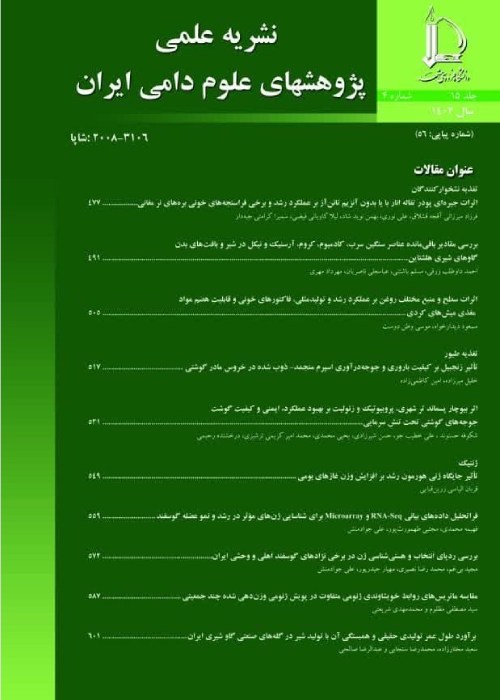Influence of Ruminal Pistachio By-products Aqueous Extract infusion on Nitrogen Balance and Rumen Fermentation Parameters in Baluchi male Sheep
According to the Food and Agriculture Organization (FAO), Iran is the largest pistachio (Pistachio vera) producer in the world. Nevertheless, pistachio byproducts (PBs) contain a high level of phenolic compounds and tannins, which can affect their utilization by animals. Tannins (hydrolysable and condensed tannin) are polyphenolic polymers of relatively high molecular weight with the capacity to form complexes mainly with proteins due to the presence of a large number of phenolic hydroxyl groups. They are considered as anti-nutritional compounds due to their adverse effects on intake and animal performance. However, tannins have been recognized to modulate rumen fermentation favourably such as reducing protein degradation in the rumen, prevention of bloat, inhibition of methanogenesis and increasing conjugated linoleic acid concentrations in ruminant-derived foods. The inclusion of tannins in diets has been shown to improve body weight and wool growth, milk yields and reproductive performance. Pistachio byproducts (PBs) contain a high level of phenolic compounds and tannins, which can affect their utilization by animals.The present study was conducted to evaluate the effects of PBs extract on nutrients apparent digestibility, nitrogen balance and ruminal fermentation characteristics in ruminants.
PBs were completely dried under sun and were ground to pass a 1 mm sieve by cyclic mill. PBs were soaked in water at 1 to 5 ratio in ambient temperature for 12 h and then were smoothed with the 4 layer cotton cloth. The extract was concentrated in an oven at a temperature below 40◦C. Four mature Baluchi male sheep (36.82 kg body weight, standard deviation 1) were fitted with ruminal cannula and were placed in individual metabolic cages with free access to fresh drinking water. The basal diet comprised 0.415 kg/d alfalfa, 0,165 kg/d barley straw and 0.250 kg/d concentrate feed (as-DM basis) that met their energy and crude protein (CP) requirements for maintenance according to the NRC (2007), and was offered in one meals. The concentrated PBs extract was infused in rumen at the levels that were administered to supply 0 (CON 1), 2, 4, or 6 % total tannin in the daily DM intake. All animals simultaneously received the same PBs extract dosage. Every period comprised 14 d of adaptation and 7 d of total urine and feces collection. Subsequent to highest PBs extract dosage, infusion was ceased and after 14 d of adaptation, urine and feces were collected again for 7 d (CON 2). Also in the end of every period rumen sampling was taken and animals were weighted.
Feed intake of animals were not affected by ruminal infusion of the different levels of PBs extract due to the restricted feeding level, but duration of feed intake was significantly increase when the concentration of PBs extract was increased. It seems, the intraruminal PBs extract application might not have interfered with diet palatability. The ruminal PBs extract infusion had no significant effect on body weight gain, DM and CP apparent digestibility but OM, NDF and ADF apparent digestibility were significantly reduced. Besides, the pronounced ability of tannins to form complexes with feed proteins; they may impair microbial degradation of other polymers such as cellulose, hemicellulose, pectin, and starch. The increasing of PBs extract concentration significantly increased rumen pH and acetate/propionate ratio and decreased rumen ammonia nitrogen, propionate, valerate and isovalerate. Lower ruminal ammonia nitrogen concentration may have resulted from a greater concentration of tannins that bound to proteins and decreased proteolysis resulting in a reduction of ammonia nitrogen release in rumen. Depression in VFA concentrations might be related to lower microbial activity of rumen in the presence of tannins. Iso-acids are derived from amino acids catabolism by cellulolytic bacteria in the rumen, that reductions their concentrations can indicate the protection of protein from bacterial deamination. Higher ruminal pH may have resulted from lower ammonia nitrogen and VFA concentrations in the rumen. The urine nitrogen excretion was reduced by increasing of PBs extract concentration, while the feces nitrogen excretion and retained nitrogen were increased. Infusion of incremental PBs extract dosages greatly shifted partitioning in nitrogen from urine to feces and could contribute to lower ammonia emissions from manure in ruminant production. The decrease in urinary nitrogen excretion can be attributed to the protein-binding property of PBs extract and the consequently lower ruminal protein degradation and ammonia nitrogen release. Besides of the tannin level, the effects of tannins differ greatly by the type and source of tannin as well as the composition of the animals’ diet.
Generally results of this experiment indicated that while the ruminal PBs extract infusion at the level that was administered to supply 4 % total tannin in the daily DM intake preserved CP apparent digestibility, it improved nitrogen balance and rumen fermentation characteristic of sheep.
- حق عضویت دریافتی صرف حمایت از نشریات عضو و نگهداری، تکمیل و توسعه مگیران میشود.
- پرداخت حق اشتراک و دانلود مقالات اجازه بازنشر آن در سایر رسانههای چاپی و دیجیتال را به کاربر نمیدهد.


